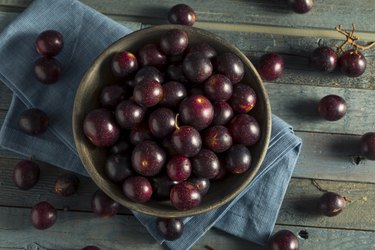
Muscadine grapes, native to the southeastern United States, aren't much like the green and red grapes you typically see in the produce aisle.
Muscadine grapes, which are sometimes called "scuppernongs," are indeed grapes, though their thick, fleshy skin might make you think otherwise. This thick outer skin protects the fruit from disease, fungi and pests, according to the North Carolina Muscadine Grape Association (NCMGA).
Video of the Day
Video of the Day
Muscadines tend to be more round than oblong, and they grow in a variety of colors ranging from greenish bronze through bronze, pinkish-red, purple and almost black, per the California Rare Fruit Growers.
Muscadine Grapes Nutrition
The nutrients in muscadine grapes can vary depending on the size of the fruit and where they're grown. According to the USDA, an average serving of 20 muscadine grapes contains:
- Calories: 68
- Total fat: 0.6 g
- Total carbohydrates: 16.7 g
- Fiber: 4.7 g
- Protein: 1 g
- Vitamin C: 9% Daily Value (DV)
- Potassium: 5% DV
Muscadine Grapes Benefits
The "mighty muscadine," as it is sometimes called, offers some impressive health benefits.
1. They're Rich in Fiber
The muscadine grapes' thick skin is what contributes to their higher fiber content. Twenty grapes contain nearly 5 grams of fiber, which is significantly more than the amount of fiber you'll find in red or green European grapes, which have 1 gram of fiber.
Eating muscadine grapes can help you reach the recommended amount of dietary fiber, which is 14 grams for every 1,000 calories per day — or between 25 to 38 grams daily, according to the Academy of Nutrition and Dietetics.
Getting enough fiber is important for maintaining a healthy weight and reducing the risk for heart disease, diabetes and cancer. Fiber also supports the gut by adding bulk to stool and helping to move food through your stomach and intestines, which can help prevent constipation, per the U.S. National Library of Medicine.
2. They Have Powerful Antioxidants
While all grapes are known for being a source of antioxidants, muscadines are an especially rich source of phenols, per an August 2012 study in the Journal of Food Science.
The skins are particularly high in the polyphenolic compound tannins, according to October 2014 research in the International Journal of Chemical Engineering and Applications.
Antioxidants can reduce oxidative stress, prevent cell damage and fight free radicals that cause diseases, per the U.S. Department of Health and Human Services.
Grapes also contain flavonoids, another group of polyphenols with potential anti-inflammatory and anti-cancer effects. Flavonoids may also play a key role in antibiotic resistance and the prevention of neurodegenerative diseases, per a December 2016 review in the Journal of Nutritional Science.
How to Eat Muscadine Grapes
While the thick skin of muscadine grapes may be off-putting to folks who've never tried the fruit, these skins are edible and provide many of the grapes' health benefits.
Some muscadine varieties have skin that is thinner or more flavorful than others. The fruit will also contain seeds, along with the pulp that you'd expect from a grape. You might be able to find seedless varieties with sweeter skin, as harvesters are constantly developing new varieties, according to the NCMGA.
While some people may choose to spit them out, the seeds are completely edible, per the NCMGA. To get the fruit's maximum nutrition, it is advised to eat every piece of the fruit — skin, pulp and seed.
Look for the whole fruit in your grocer and at the farmers' market. Muscadine grapes are also sold in wine products, jams, jellies and juices.
Recipes With Grapes to Try
- NPR: Muscadines May Be The Best Grapes You've Never Tasted
- U.S. National Library of Medicine: "Antioxidants: In Depth"
- Journal of Food Science: "Analysis of Phenolic Composition of Noble Muscadine (Vitis rotundifolia) by HPLC‐MS and the Relationship to Its Antioxidant Capacity"
- International Journal of Chemical Engineering and Applications: "Phenolics in Human Health"
- Journal of Nutritional Science: "Flavonoids: an overview"
- North Carolina Muscadine Grape Association: "About Muscadines"
- USDA: "Muscadine Grapes"
- Academy of Nutrition and Dietetics: "Fiber"